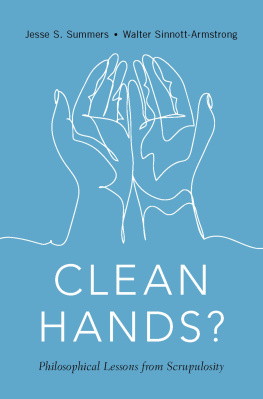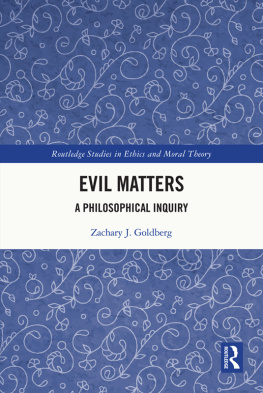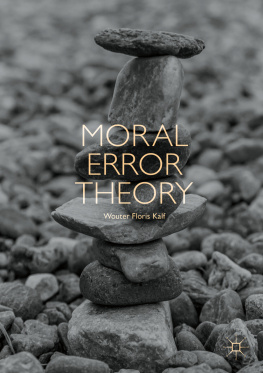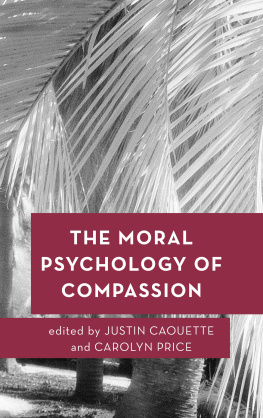Clean Hands?

Oxford University Press is a department of the University of Oxford. It furthers the Universitys objective of excellence in research, scholarship, and education by publishing worldwide. Oxford is a registered trade mark of Oxford University Press in the UK and certain other countries.
Published in the United States of America by Oxford University Press
198 Madison Avenue, New York, NY 10016, United States of America.
Oxford University Press 2019
All rights reserved. No part of this publication may be reproduced, stored in a retrieval system, or transmitted, in any form or by any means, without the prior permission in writing of Oxford University Press, or as expressly permitted by law, by license, or under terms agreed with the appropriate reproduction rights organization. Inquiries concerning reproduction outside the scope of the above should be sent to the Rights Department, Oxford University Press, at the address above.
You must not circulate this work in any other form and you must impose this same condition on any acquirer.
Library of Congress Cataloging-in-Publication Data
Names: Summers, Jesse S., author.
Title: Clean hands? philosophical lessons from scrupulosity /
Jesse S. Summers and Walter Sinnott-Armstrong.
Description: New York : Oxford University Press, 2019. |
Includes bibliographical references and index.
Identifiers: LCCN 2018061613 (print) | LCCN 2019980264 (ebook) |
ISBN 9780190058692 (cloth : alk. paper) | ISBN 9780190058722 (ebook) | ISBN 9780190058715 (epub)
Subjects: LCSH: Scruples. | PsychiatryPhilosophy.
Classification: LCC BJ1278. S37 S86 2019 (print) |
LCC BJ1278. S37 (ebook) | DDC 155.2/32dc23
LC record available at https://lccn.loc.gov/2018061613
LC ebook record available at https://lccn.loc.gov/2019980264
1 3 5 7 9 8 6 4 2
Printed by Sheridan Books, Inc., United States of America
to Mara, manager of anxiety
to Liz, my obsession and compulsion
Contents
When Walter first asked me several years ago, not long after wed met, whether Id ever heard of moral OCD, I imagined moral OCD in exactly the naive way that many people think of OCD more generally, as being overly concerned with something: those with hand-washing OCD want very clean hands, cleaner than most, and they clean them far beyond what anyone else would tolerate. They are obsessed with hand-washing the way someone might be obsessed with Star Wars or with making to-do lists: they love it and are very, even overly concerned with it. When people casually refer to themselves as being a little OCD about something like having their books arranged in a certain way, what they have in mind is this naive understanding of OCD. Of course, someone who is a little OCD about how their books are lined up on the bookshelf wont stay up all night with a ruler going over the same shelf multiple times. For that matter, someone who is a little OCD about having clean hands will stop washing before theyve rubbed their hands entirely raw. So this naive understanding of OCD is misleading. People with OCD arent just very concerned with something. They also have problems controlling their thoughts and actions.
Both Walter and I had previously, separately, worked on addiction, another kind of irrational behavior in which people fail to control their actions. Whats puzzling about addiction is that addicts often know they should quit, even say that they want to quit. They see the costs of their addictions. Yet they dont quit; or if they do quit, they later relapse. People with OCD similarly often know they shouldnt act as they do, even say they dont want to act this way, yet they continue to do it. Whats different from addiction is that, as well see, there is a widely accepted explanation of why those with OCD act as they do: anxiety. The role anxiety plays in OCD is complicated and sometimes subtle, but anxiety is what ultimately unifies explanations of OCD. A person with hand-washing OCD doesnt just want her hands to be clean: she is anxious that theyre not clean or about what might happen if theyre not clean.
The question for us, then, was whether moral OCDor Scrupulositycould be understood in this way. If so, Scrupulosity seems very different from sainthood. Saints arent motivated to be moral by anxiety, are they? Those who are worried about going to hell if theyre sinners arent worried about morality: theyre worried about hell. They might or might not act the same as someone motivated by morality, but motivation by anxiety seemed fundamentally incompatible with motivation by morality.
As I said, though, motivation by anxiety is complicated and subtle, and our understanding of how anxiety motivates both Scrupulosity and morality developed significantly as we worked on this project. At the University of Arizonas Workshop in Normative Ethics (WiNE), where we presented on Scrupulosity and moral judgments, Liz Harman and Hallie Liberto perceptively asked why genuinely moral judgments couldnt be motivated by anxiety, while Charlie Kurth presented on the positive role that (non-pathological) anxiety can play. These exchanges, among many others, ultimately led us to develop a far more nuanced position on the role of anxiety than we had held up to that pointand one more nuanced than the position we published in some of our earlier articles on this topic.
What distinguishes Scrupulosity from ordinary moral judgments isnt, we came to see, the mere presence of anxiety or even the fact that anxiety is motivating. This is because there are ways in which anxiety might plausibly play some motivating role in a moral judgment. Doing something good because of your anxiety about otherwise going to hell might not be moral, but doing something good because of your anxiety about otherwise doing the wrong thing might be.
What we came over time to believe distinguishes Scrupulosity from ordinary morality is not the motivating anxiety alone but the distorted features of moral judgments that anxiety causes. Anxietyat least in those with OCDmakes people focus on what will legitimate or reduce their anxiety. That focus corrupts what might otherwise be a perfectly normal moral judgment, and makes it into something that, at its most corrupted, is plausibly no longer a moral judgment at all. The implications of that central thought expanded to shape the rest of what is written here.
Of course, our work on this topic over the years has also benefited in many other ways from many other influences. Walter and I owe thanks to enough people who have discussed this topic with us over the years that we cannot hope to remember and thank everyone. Neither of us is scrupulous enoughfortunately or unfortunatelyto keep track of every useful interaction weve had on this topic. Here are at least some of the people who helped us think more carefully about this topic: Jon Abramowitz, Nomy Arpaly, Laura Crosskey, Julia Driver, Iskra Fileva, Gary Gala, Molly Gardner, Harlin Gradin, Christine Lille, Daniel Moseley, Lauren Olin, Roger Perilstein, David Shoemaker, Liz Sinnott-Armstrong, Holly Smith, Chandra Sripada, and audiences at the American Philosophical Association, the Moral Psychology Research Group, the Southern Society of Philosophy and Psychology, Beth El Synagogue, and the Universities of Alabama, Oxford, and Pennsylvania. Thanks to Lizzie Schechter for coming up with the book title. Thanks to the members of MAD lab and the Kenan Institute for Ethics for repeated feedback and support. Special thanks to Michael McKenna for arranging and the University of Arizona philosophy department for hosting an amazing extended discussion of the entire manuscript, to Fr. Thomas Santa for allowing us to visit one of his retreats for people with Scrupulosity, and to its participants for sharing their experiences with us.









